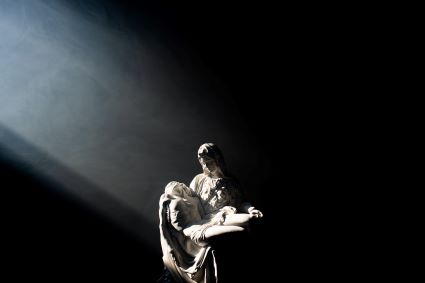On this All Souls’ Day, we may find ourselves with a different perception of death this year. The weight of lost loved ones is always painful, but this year definitely hits deeper with the hundreds of thousands of lives lost to COVID-19, with the pain of not being able to have funerals in the spring, and with a greater awareness of our own mortality in all the pandemic has brought on. Life is short and sacred and so precious.
First, I will say this: it is *good* to mourn, to grieve, to cry. Even if you don’t have someone close to you that died of COVID-19, but you find yourself aching and sad about the immense loss, amen! That shows the love in our hearts for others, the Christlike love that we are supposed to reflect. It is *okay* to feel overwhelmed by death, especially during this time–how could we not? Jesus is very close to us, that is for sure. Let Him hold you, let Him love you, and hold onto Him for everything you need.
So how do we grapple with all of this, with this heavy burden that has just been so brutal and overwhelming? When we look to Jesus in this, what do we see?
I see our Lord who knows our pain better than we can understand, who made Himself weak to take on all our weaknesses and sin and pain. I see our Lord who when we cry, our tears become His tears. I see our Lord who wept over His friend Lazarus and who promises to wipe all our tears away. I see our Lord who is with us in our grief and sees us through: “Though I walk in the valley of darkness, I fear no evil, for you are with me” (Psalm 23).
I see our Lord who redeems, who is not afraid of death, because He would not let Himself be held by it. I see our Lord who took all of our sin and suffering onto Himself, tortured and bloody on the Cross. I see our Lord who thought of each of us with intense longing and love as He died, choosing death so that death would never have to have the final word for us or for our loved ones: “If, then, we have died with Christ, we believe that we shall also live with him” (Romans 6:8).
I see our Lord who makes all things new, who opened Heaven for us. I see our Lord who constantly draws us close to Himself. I see our Lord who wants to spend eternity with us in Heaven and made that possible for us because He loves us just that much: “The souls of the just are in the hand of God, and no torment shall touch them” (Wisdom 3:1).
The cries of our hearts when we lose someone we love are very dear to our Lord. He has not forgotten them. And so we unite our hearts today to pray for the souls of all those who have died, that everyone may reach eternal life in Heaven. Death does not have the final word, dear friends.
Pray with me: Lord, we offer everything today for the souls in purgatory, for the souls of all of our loved ones who have died, and for the souls of all the lives lost in the pandemic. We unite our aching hearts to Your Sacred Heart, pouring out everything at Your feet as a sacrifice of praise. May our cries rise like incense to Your throne, and may we grow in holiness every day to one day see You face to face. Thank You for dying and rising for us, Lord. May the souls of the faithful departed, through the mercy of God, rest in peace. Amen.


